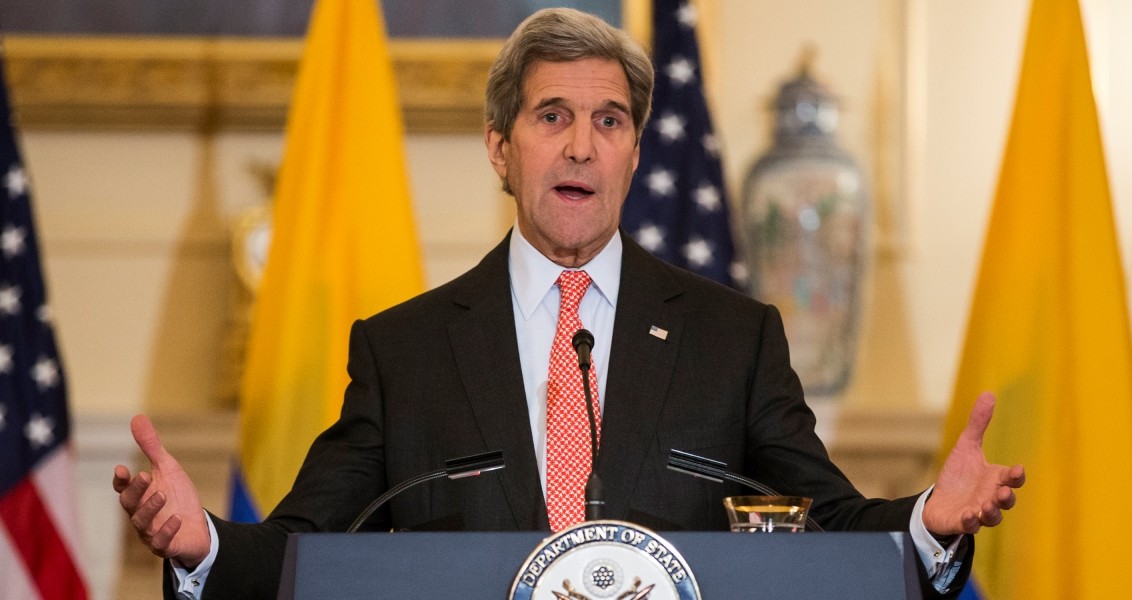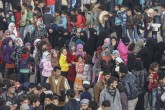There are increasing questions regarding U.S. policy in Syria since the publication of pictures of the special presidential envoy for the Global Coalition to Counter ISIL (DAESH), Brett McGurk with former PKK members in Kobani. The absence of a pronounced strategy for years is about to be transformed into a condition in which operations on the ground run its policy in Syria. Currently, it is has started to be perceived that in the eastern part of the country, Peoples’ Protection Units (YPG) operations are increasingly shaping U.S. policy, whereas in the western part, Russian airstrikes on the opposition are making the U.S. take steps that will make Syrian President Bashar Assad’s regime forces and Russia more successful on the ground. We have started to see an almost bandwagoning superpower in Syria.
Last week, one of the most debated issues concerning U.S. policy in Syria was the picture of McGurk visiting YPG forces and the statements made by U.S. State Department spokesmen. The picture and statement showed increasing U.S. commitment to the YPG in the eastern part of the country. This visit and statement demonstrated that regardless of the details of the interagency problem regarding the visit, the U.S. is taking steps that may damage the future of its relations with its allies.
Aside from U.S. support for the YPG, there is a second question about the future of U.S. policy in Syria concerning the relationship between the U.S. and the Syrian opposition. For a significant period of time, the only major support, as far as we know, on the ground in Syria has been for the YPG, which is hard to consider an opposition force in Syria. While considering these forces as its partner in its fight against DAESH, there is no similar commitment demonstrated by the U.S. concerning its relations with the Syrian opposition. While avoiding fully supporting the opposition by saying that many of the people were farmers or dentists or maybe some radio reporters who did not have a lot of experience fighting, the U.S. provided arms and advice to the YPG in the fight against DAESH. The air cover for the YPG was a major factor in the success of these forces against DAESH.
In addition to this double standard in terms of providing support, the U.S. administration in the last five months has done little to stop Russia and Syrian regime forces from bombing opposition forces. Since September, several different reports and statements have said that Russian airstrikes targeted U.S.-funded and supported forces in the country. Only a few days after these strikes, U.S. Republican Senator John McCain, head of the Senate Armed Services Committee, in an interview said: “I can absolutely confirm to you that they were strikes against our Free Syrian Army recruits that have been armed and trained by the CIA because we have communications with people there.” A few days later, the Wall Street Journal, depending on U.S. officials, reported: “Russia has targeted Syrian rebel groups backed by the Central Intelligence Agency in a string of airstrikes running for days, leading the U.S. to conclude that it is an intentional effort by Moscow.” Later it was revealed that despite “U.S. anger and reaction,” the Russian air force continued its attacks on these opposition forces. The Institute for the Study of War (ISW) reported in late October: “Russia’s air campaign continues to marginalize moderate elements of the Syrian opposition by targeting moderate, U.S.-backed TOW anti-tank missile recipients.
Russian airstrikes killed the Chief of Staff of U.S.-backed TOW missile recipient First Coastal Division in the vicinity of Jebel al-Akrad on Oct. 19.” Since then, neither the trajectory of these attacks nor the tone of the U.S.’s reaction has changed.
With the Geneva process, the relationship between U.S. administration officials and the Syrian opposition has started to become more problematic. The administration seemed to be increasingly pressuring the opposition to engage in talks with the regime without the regime stopping the bombings and the siege and starve strategy around the country. Some news outlets started to report tense meetings between U.S. Secretary of State John Kerry and representatives of the Syrian opposition. According to The New York Times: “Mr. Kerry seemed to blame the opposition for refusing to participate in United Nations-led talks in Geneva,” and added: “It’s going to get much worse. This will continue for three months, and by then the opposition will be decimated.” After further questions he said: “What do you want me to do, go to war with Russia?” It would be unrealistic to think that the U.S. administration did not see Russia and the Syrian regime’s strategy to gain more time to clear the region of the opposition forces. While the U.S. was pressuring the opposition to engage in dialogue, the supposed “partners in peace” were bombing major population areas under opposition control. So it looks like the U.S. strategy in western Syria is increasingly being shaped by Russia and the regime’s operational successes on the ground.
The recent announcement of a cessation of hostilities will probably bring the same outcome. A recent ISW report about this agreement provided a detailed analysis of the situation after this announcement. The report says: “The ‘cessation of hostilities’ declared on Feb. 11, 2016, permits Russia and the Assad regime to continue targeting U.S. allies in Aleppo under the pretext that the opposition in the city consists predominantly of al Qaeda affiliate Jabhat al Nusra. The Russian view of the situation in Aleppo is false and deliberately distorting. There are multiple opposition groups within Aleppo that are distinct from Jabhat al Nusra, do not share its vision, and which the United States must support and strengthen.”
In fact, U.S. policy in Syria is increasingly becoming hard to understand and comprehend. After five years of rhetorical action against the Assad regime, the U.S. administration is now militarily supporting the YPG against DAESH and seems to be pressuring the Syrian opposition to accept conditions that would make them more vulnerable to the Syrian-Russian coalition. Not a lot of observers are optimistic about this “cessation of hostilities” or an agreement after the Geneva process, and the U.S. seems to be letting the outcome of different operations shape its strategy in the country.
[Daily Sabah, February 15, 2016]
In this article
- Foreign Policy
- Opinion
- Security
- 2016
- Al Qaeda
- Aleppo
- Assad Regime
- Bashar Al Assad
- DAESH
- Daily Sabah
- Fight against DAESH
- Fight Against Terror
- Free Syrian Army
- Free Syrian Army (FSA)
- Geneva process
- Kobane
- Kurdistan Workers' Party Terrorist Organization (PKK)
- Middle East
- NATO
- Opposition
- People's Protection Units (YPG)
- PKK - YPG - SDF - PYD - YPJ - SDG - HBDH - HPG - KCK - PJAK - TAK - YBŞ
- Russia
- Superpower
- Syria
- Syrian Civil War
- Syrian Conflict
- Syrian Crisis
- Syrian Opposition
- Syrian Regime
- Terror
- The New York Times
- The New York Times (NYT)
- U.S. Secretary of State
- United Nations (UN)
- United States (US)
- USA
- Wall Street Journal (WSJ)
- Western World



